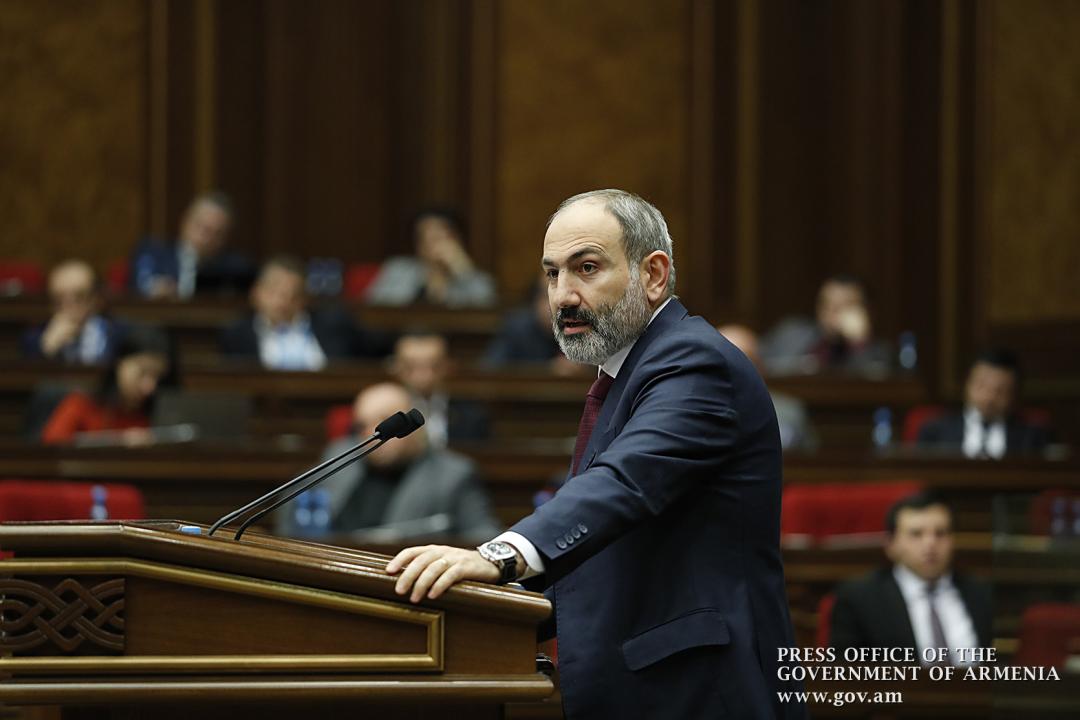
Pashinyan presents action plan for the following five years

At the Armenian government's cabinet meeting on August 18, Prime Minister Nikol Pashinyan presented the government's action plan for the period 2021-2026. The action plan consists of the following six sections: security and foreign policy, economy, infrastructure development, human capital development, law and justice, and institutional development.
The Armenian head of government pointed out that this government program is based on the commitments made by the ruling Civil Contract party to the citizens of the Republic of Armenia during the campaign for the early parliamentary elections on June 20, on the promises made to them before the elections, and on the strategy for the transformation of Armenia by 2050.
According to Pashinyan, the atmosphere of public and political unrest that began after the end of the war in November 2020 was overcome by the election results. However, many external and internal challenges that threaten Armenia remain unresolved. The severe aftermath of last fall's 44-day war significantly altered Armenia's external environment, not only exacerbating a number of pre-existing challenges but also bringing new ones, Pashinyan said. Protecting Armenia's external security, sovereignty, and territorial integrity, finding a just solution to the Nagorno-Karabakh conflict, and creating a favorable regional and international atmosphere around Armenia remain priorities, he said. The government intends to take serious measures to unite the best public and national potential, the Armenian prime minister said.
According to Pashinyan, establishing national unity based on the rule of law and rights, mutual respect, and the exclusion of hate speech and words that degrade human dignity is one of the government's priority tasks. "The misunderstanding of democracy as a breeding ground for permissiveness and impunity poses a serious threat to the rule of law, public security, the rule of law and justice," he added.
The prime minister pointed out that opening an era of peaceful development for Armenia and the region is the biggest task the government has to fulfill in the name of the people after the early elections. "The government realizes that the solution of this problem depends not only on the Republic of Armenia, but also on the attitude and will of the other countries in the region," he said. The government of the Republic of Armenia assumes its share of responsibility to usher in an era of peaceful development in the region," the prime minister added.
Nikol Pashinyan said that the process of reforming the Armenian Armed Forces has begun and is continuing on a large scale in Armenia. "The reformed armed forces will be the most important factor in ensuring our external security," the prime minister added.
He stressed that the next key factor in ensuring security is an active foreign policy. "Armenia will pursue an active and proactive foreign policy and strive for effective working relations with all countries and international organizations," Pashinyan said. Regarding foreign policy, the prime minister said, "An important factor is the Armenian-Russian strategic alliance and the republic's membership in the CSTO. The creation of a stable regional environment and the release of regional infrastructures were emphasized. This is a novelty, because in our foreign policy orientation we give a special place to regional foreign policy. We emphasize the role of the OSCE Minsk Group Co-Chairs in resolving the Nagorno-Karabakh conflict and clarifying the final status of Nagorno-Karabakh. The full restoration of the peace process in the format of the OSCE Minsk Group Co-Chairs is an essential factor for regional stability. The [Armenian] government's program has formulated a certain positioning on the July 29 statement of the OSCE Minsk Group Co-Chairs. We have formulated our program in such a way that it largely corresponds to the demands of the OSCE Minsk Group Co-Chairs on resumption of the Nagorno-Karabakh peace process," Pashinyan said.
The Armenian prime minister said that the next direction to ensure security is the formation of a stable system of national security bodies. "We have been talking about the reforms of the National Security Service and the national security system for a long time. Our plan is that in the near future the Border Troops of Armenia will receive more territories from the Armed Forces, i.e. the territories [under their jurisdiction] will be expanded. In this regard, the border troops are to be expanded, transformed and reformed. This expresses our intention and goal to advance the peaceful regional agenda. As a rule, the border forces assume responsibility for the areas that are considered non-war zones, i.e., peace zones. In the next five years, a foreign intelligence service will be established in Armenia," the Armenian Prime Minister concluded.
Regarding railroad communications, Pashinyan informed that the South Caucasus Railway (subsidiary of Russian Railways) will invest about $79,416,800 in this sphere by 2024: "It was agreed that by 2024 we will have a railroad of a different quality. It is very important to emphasize that significant changes are also taking place in the field of air transport. In this new era, two local airlines are being established in Armenia, of course with foreign investments, which does not worsen the rating, but improves it. The aviation sector shows good dynamics in attracting foreign investments. Our main task will be to increase investment interest in order to effectively support investments."
See Also


Armenia Records 5.9% GDP Growth in 2024, Missing 7% Goal

Yerevan Balances Strategic Ties with Both US and Russia, Says Foreign Minister

FM Mirzoyan: Peace Deal with Azerbaijan Is Within Reach

Pashinyan and Erdogan Hold Call, Reaffirm Commitment to Ongoing Dialogue

